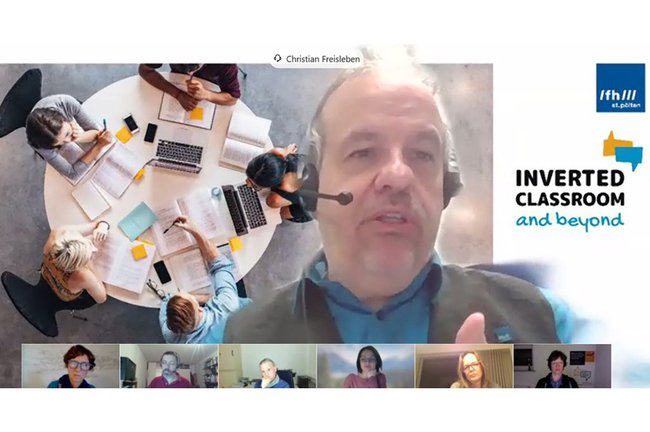Stimuli for Innovative Didactics
Report on the Symposium “Inverted Classroom and Beyond” 2021

The conference “Inverted Classroom and Beyond” (icmbeyond) provides a key stimulus for the further development of the Inverted Classroom Model and innovative didactics in the higher education sector in the German-speaking world and beyond.
The conference, which celebrated its tenth anniversary this year, was held online on 23 and 24 February. Hosted by the St. Pölten UAS, the event’s main focus was on didactics and distance teaching in times of COVID-19.
Innovative Teaching Methods: the Inverted Classroom
The Inverted Classroom Model (ICM) is a concept offering students or school pupils various preparatory materials to work on assignments, stimuli and questions in a very autonomous manner, either alone or in small groups. A presence phase is dedicated to deepening, applying, discussing, and further developing contents through a variety of dialogue-oriented and participatory formats.
The symposium icmbeyond presents current developments of this innovative teaching method. This year’s conference also featured stimuli on and lessons learned from distance teaching during the coronavirus pandemic.
“Once again, our highly committed participants and presenters enabled us to learn both together and from each other, which is truly inspiring”, explains Christian F. Freisleben-Teutscher, Section Head for Inverted Classroom at the St. Pölten UAS and member of the icmbeyond programme committee.
Innovative Keynote and Diverse Education Topics
Rebekka Schmidt and Ilka Mindt of Paderborn University prepared a creative keynote allowing listeners to participate in the decision which contents should be covered in detail, thus creating an opportunity to explore the basic principles of the Inverted Classroom Model together.
“During the symposium, it became increasingly clear that student engagement, e.g. both the students’ own commitment and participation and the deliberate act of encouraging and involving them, can open up new possibilities for digital teaching formats in general, and also for the inverted classroom”, says Schmidt. “The concept focuses both on the students’ and the lecturers’ teaching and learning processes. This is why student engagement, especially within the framework of the inverted classroom, allows us to define, observe and research diverse und multi-dimensional aspects of teaching and learning”, adds Mindt.
Among other things, the lectures and discussions at the conference explored how the students’ knowledge, interest and motivation for learning can be promoted in (virtual) inverted classrooms. Representatives of TU Darmstadt introduced e-learning concepts on exploratory learning. Lecturers of the St. Pölten UAS shared their experience with the Inverted Classroom Model. During a plenary discussion, the symposium participants reflected on the future of the model.
Discussion Forum, COVID-19, Digital Natives, etc.
Representatives of the UAS Grisons presented their approaches on how to transfer the higher education atmosphere to virtual space and organise the onboarding process of new students online.
A discussion forum was dedicated to digital teaching in times of COVID-19 and the question whether the notion that children and adolescents are the digital natives of today is correct. Researchers and lecturers presented their projects at virtual DisQSpace “stations”.
Research Workshop
On day two, a research workshop took place following a special future workshop format. Participants created a collaborative white paper offering ideas on how to advance research on the ICM by formulating in-depth questions and working on innovative formats and methods. As a result, the participants agreed on three focus areas for collaborative further development within the next months.
In end of next week, a comprehensive documentation of the conference will be made available online at icmbeyond.net
Inverted Classroom and Beyond 2021
Online, 23 and 24 February 2021
The symposium is currently organised by five higher education institutions in the German-speaking region: the St. Pölten UAS, which hosted the icmbeyond this year; Padernborn University, which will be the next host in 2022; the Lower Austrian Pedagogical University; the Osnabrück University of Applied Sciences; and the PH Nordwestschweiz FHNW.